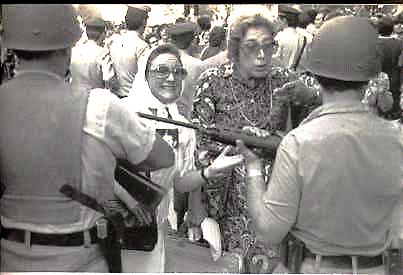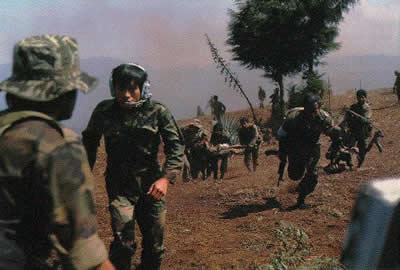History of Latin America
...to Right
Lecture outline
Readings: Verbitsky, Chapters 1-5 + Afterword
(If you want to go further, I especially recommend Ch. 10,13,14,16)
 |
 |
This week we look at the military dictatorships that responded to the social upheavals of the Cold War.
Almost all were anti-Communist and politically conservative.
Above, left: Argentinian soldiers confront the Madres de la Plaza de Mayo, who demanded the opening of military records every Thursday beginning in 1977. They make an interesting comparison to the Cuban Damas de Blanco.
Above, right: A wounded soldier being evacuated in northern Quiche, Guatemala, in the early 1980s.
Websites
Arturo Alessandri, a Chilean conservative, on the circumstances leading to the coup of Sept. 11, 1973. Look also at the interviews of Duane Claridge for a soft Alliance for Progress perspective from the U.S., and of Paul Wimert for a U.S. military perspective.
The trial of Adolfo Scilingo in Spain. There's lots more on the Scilingo trial and the trial and legacy of Pinochet on the web.
Courtroom reaction to the judgment in September 2006 against Miguel Etchekolatz, former police commissioner of Buenos Aires accused of murder and 'genocide' (the first time this term was officially used) during the Dirty War. For those who understand Spanish, here is Etchekolatz explaining his views to a news program filmed as the internal war was in progress.
A recent article on the children of the disappeared, often adopted by their parents' killers, who are now in their 30s and discovering the past. One pair of siblings from Argentina's wealthiest media family has resisted DNA testing, while another has tried to have ex-dictator Jorge Rafael Videla removed as his baptismal godfather. (Google the title of this last article in order to see it past the firewall).